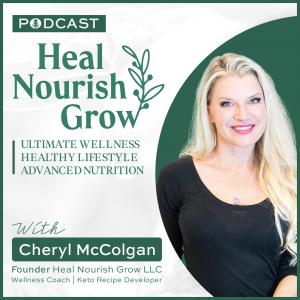Heal Nourish Grow Podcast

Middle Age Weight Loss Through Research Based Strategies
In this episode, we talk all about the challenges of weight loss and aging as well as strategies to cope. Recent research points to consistent movement, optimal protein intake and resistance training as key strategies for weight loss, especially as we age. Cheryl shares her personal experiences and provides recommendations based on what she's learned over the last several years. In this conversation, Cheryl shares various strategies for overcoming weight loss resistance. She emphasizes the importance of prioritizing protein intake, tracking food and exercise, getting quality sleep, managing stress, incorporating movement throughout the day, and engaging in resistance training. She also discusses the role of nutrition in weight loss and the importance of finding a sustainable eating plan that aligns with individual goals. Additionally, Cheryl touches on the significance of body composition measurements, the potential benefits of fasting, and the importance of seeking medical advice and testing if weight loss resistance persists. Creatine+Taurine (HNG10 at checkout to save) for Muscle and Brain Health High Protein Diet For Fat Loss Research Paper High Protein Diet For Appetite Regulation and Body Composition Forever Strong, Dr. Gabrielle Lyon People I'm following for weight loss/aging/menopause information: Dr. Mary Claire, Wise and Well, Dr. Jamie Seeman and Dr. Gabrielle Lyon Watch on YouTube https://youtu.be/0mct5ytsJZ0 Takeaways Protein intake is crucial for weight loss, with recommended amounts ranging from 0.8-1.2 grams per pound of body weight. If your current weight loss strategies aren't working, consider making changes to your diet and exercise routine. Managing stress and improving sleep are important factors for successful weight loss. Supplements such as aminos and creatine can support muscle growth and cognition. Make small changes over time and track your progress to achieve long-term success. Prioritize protein intake to support weight loss and muscle growth. Track food and exercise to stay accountable and make informed choices. Get quality sleep and manage stress to support weight loss efforts. Incorporate movement throughout the day to increase activity levels. Engage in resistance training to build muscle and boost metabolism. Find a sustainable eating plan that aligns with individual goals. Consider body composition measurements to track progress. Explore the potential benefits of fasting, but prioritize protein and resistance training. Seek medical advice and testing if weight loss resistance persists. Transcript: Cheryl McColgan (00:01.122)Well, hello friends. Welcome back to the Heal Nurse Show podcast. Been on a bit of a break and before we get into the topic today, I just wanted to share with you that it has been a very busy summer and I can't believe that we are so far into it. mean, Labor Day is just about four weeks away at this point. I mean, this has just flown by. Lots of events we had to attend to, sold a house, so just a lot going on, which is why I had little bit of an unintentional break, but it is good to be back on the mic. And what actually prompted me to take on this subject today is I had a conversation with a good friend of mine yesterday, kind of all around this topic around aging and weight gain and just not feeling good, that sort of thing. And then I had somebody else reach out to me again today. And these two people are very different ages, but I think that the things that I'm going to talk about and share with you today, number one can be really applied to weight loss at any age, but number two are particularly even more important as you do get older. And I'll go into some of the reasons why. So it's interesting because the reason that people tend to reach out to me with this sort of thing is they know that I keep up on all the research and I'm constantly listening to






 Visit Podcast Website
Visit Podcast Website RSS Podcast Feed
RSS Podcast Feed Subscribe
Subscribe
 Add to MyCast
Add to MyCast